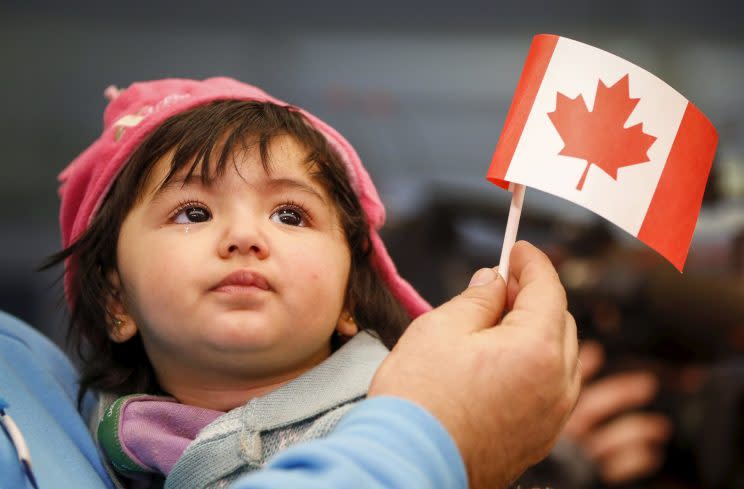New data shows Canada may not be the nation it thinks it is at 150

People outside of this country may be confident in their assumptions that Canadians are friendly, polite, peaceful and tolerant. But go to a Timmys and ask two different Canadians how they define themselves and the answers you get may be vastly different depending on whether they’re from the East or the West, Francophone or Anglo, first-generation or seventh.
Or will they?
Yahoo Canada partnered with Ipsos Public Affairs to explore how Canadians view their relationships with the world and each other. In today’s political climate, we wanted to see whether we are actually as welcoming, inclusive and progressive as we seem in comparison to countries such as the United States and England, seeking to tighten their borders and rethink multilateralism.
Opinions on the results:
Throughout April, we surveyed Canadians to gauge sentiment on the national priorities, and core values that define us. We also wanted to know how the election of Donald Trump as president of the U.S. has affected Canadians’ impressions of leadership qualities and their own mobility.
Overall, the data suggests Canadians are most concerned about maintaining our “social solidarity” by prioritizing a strong health care system for all and reducing poverty and the nation’s economic burdens.
More from our Canada 150 series:
More startling, however, was evidence that the nationalistic sentiments that gained traction in the U.S. during last year’s presidential election may have migrated north. More than half of respondents appear worried that immigrants and refugees are causing an erosion of “Canadian values” and public safety.
That’s not to say Canadians oppose helping the less fortunate. Wide margins of Canadians support taxpayer-funded poverty alleviation programs. That more compassionate touch is displayed by Canadians’ preference for Justin Trudeau’s leadership style over that of Donald Trump.
In the polling, two overwhelming concerns among Canadians became clear: healthcare and employment. Ipsos’ Vice President of Public Affairs Sean Simpson says he isn’t surprised.
“When the economy is not in great shape, the economy [jobs] will come up and will challenge healthcare for the number one issue. And everything else tends to be a secondary issue,” said Simpson. “Get people employed, keep them healthy and everything else is secondary.”
However, few issues have received as much public attention this year as immigration and refugees policies. Scenes of happy Syrian families arriving at Canadian airports have been replaced by more ominous stories of asylum seekers trying to navigate across the Canada-U.S. border in the freezing dead of night.
While almost no one questions the idea that Canada has become a nation of immigrants, if not recent arrivals the certainly first- and second-generation communities, poll data shows many now are wary of immigrants and refugees.
A slim majority of Canadians polled, 57 per cent and 55 per cent respectively, say refugees and new immigrants are a threat to Canadian values. A further 53 per cent of say refugees threatened Canada’s safety.

“I think what’s happening here is that there’s a disconnect between the outward and the inward [attitude towards immigration],” said Simpson. “And that’s a wake up call. It’s a reality check because I think we think of ourselves in certain way and maybe we’re not that way.”
However, the data also shows Canadians see benefits of welcoming immigrants and, to a lesser extent, refugees. More than half of respondents, 58 per cent, said that Canada is better off because of immigrants, and 45 per cent said the same of refugees, with millennials being most supportive of both groups compared to Baby boomers.
“It portends, because of demographics, that we will become more tolerant, more welcoming as, I hate to say it, as the boomers move on and as millennials age,” said Simpson, “because they seem to be the most positive towards immigrants and refugees.”
Despite the changing attitudes among younger Canadians, it’s important to parse the difference between immigrants and refugees. Immigrants are approved for entry through the immigration process, where they are assessed as either a liability or a boon to the country. Canada currently sets a limit of approximately 250,000 immigrants per year.
Refugees, on the other hand, are admitted on the basis of what Canada can do for them, and the limit is less precise as it’s subject to global events. Based on CBC analysis, Canada has welcomed around 26,000 refugees each year over the past decade.
When Canadians were asked to think with their wallets and prioritize how tax dollars should be spent, the majority ranked assisting families in need and the homelessness at the top of their list.

But perhaps more surprising, at the height of efforts for reconciliation and rebuilding of relationships with Canada’s First Nations, less than a quarter of Canadians polled believe investing funds to improve Indigenous communities should be a priority.
On the question of effective leadership leadership, Canadians overwhelmingly selected Justin Trudeau as their preferred leader, although U.S. President Donald Trump did receive high marks in some important categories.

That a quarter of Canadians feel Trump does a better job at national security and almost as many feel he’s better at delivering on economic growth may help explain why Canadian voters are so concerned about economic uncertainty or an influx of refugees.
Perhaps the country is still shaken by economic events from a decade ago. Or maybe Canadians are getting more skeptical as cynicism increases as to whether global security and relationships are getting worse, not better.
Whatever the case, these results reflect a country that is living up to its reputation as a welcoming and caring one, albeit with less open arms and minds than people outside our borders may believe.




